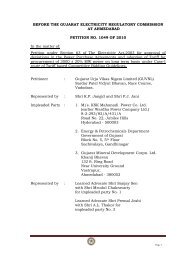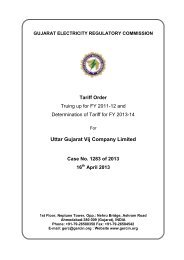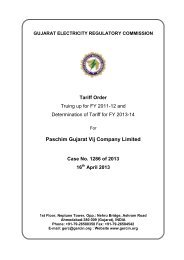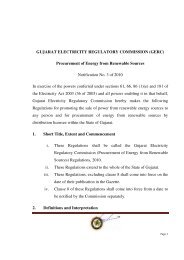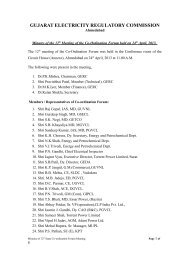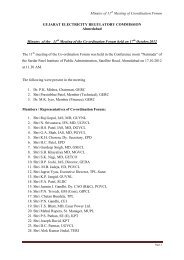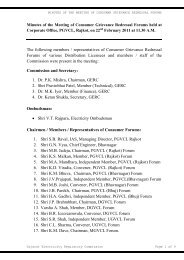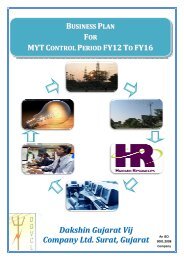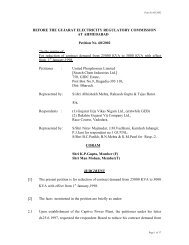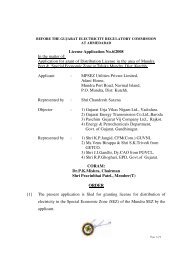Dakshin Gujarat Vij Company Limited Suo - Motu Case No ... - GERC
Dakshin Gujarat Vij Company Limited Suo - Motu Case No ... - GERC
Dakshin Gujarat Vij Company Limited Suo - Motu Case No ... - GERC
Create successful ePaper yourself
Turn your PDF publications into a flip-book with our unique Google optimized e-Paper software.
16. FPPPA Charges<br />
<strong>Dakshin</strong> <strong>Gujarat</strong> <strong>Vij</strong> <strong>Company</strong> <strong>Limited</strong><br />
Truing up for FY 2010-11<br />
and Determination of Tariff for FY 2012-13<br />
Objection: DISCOMs in <strong>Gujarat</strong> are charging very high FPPPA charges and<br />
increasing the same day by day, whereas no other SEBs have done like this, while<br />
the hike in fuel prices equally implies to all States. Hence, it is not justified to levy<br />
steeply hiked FPPPA.<br />
Response of the Licensee: The FPPPA charges are calculated as per the formula<br />
approved by Hon‟ble Commission and recovered as per the order of the Hon‟ble<br />
Commission.<br />
Commission’s View: The licensee is entitled to recover increase with reference to<br />
the base price approved by the Commission in the Tariff Order during the year from<br />
the consumers as per the FPPPA formula. The Commission would like to highlight<br />
that the APTEL vide its order dated 11 th <strong>No</strong>vember, 2011 has asked the State<br />
Electricity Regulatory Commissions in India to pass the power purchase hike to the<br />
consumers preferably on monthly basis.<br />
17. Simultaneous Maximum Demand (MD) for Railways<br />
Objection: The representative of railways has requested that the demand charges<br />
should be based on Simultaneous Maximum Demand recorded at various traction<br />
substations. If not, railway traction tariff should be made a single part tariff.<br />
Response of the Licensee: The licensee has submitted that for motive power<br />
consumer two part tariff is universally accepted i.e. Fixed/Demand charges & Energy<br />
charges. As such, the company incurs substantial “fixed costs” in maintaining the<br />
power supply to consumers apart from the energy/ variable charges it pays for the<br />
energy bought by it. These fixed costs include fixed charges paid to power plants,<br />
recurring costs of capital expenditure such as interest costs, depreciation and other<br />
O&M expenses etc. In respect of the above, It is submitted that the Appellant‟s<br />
request that the Demand Charges be based on the Maximum Demand recorded at<br />
all the Railway Traction Sub-Station [TSS] of the DISCOMs is not reasonable due to<br />
the fact that the distribution network has to service to the maximum local demands<br />
and hence, investments are triggered by the local (in other words, noncoincident/separate)<br />
peaks in demand.<br />
Commission’s View: The objection and the response are noted.<br />
<strong>Gujarat</strong> Electricity Regulatory Commission Page 24<br />
June 2012



